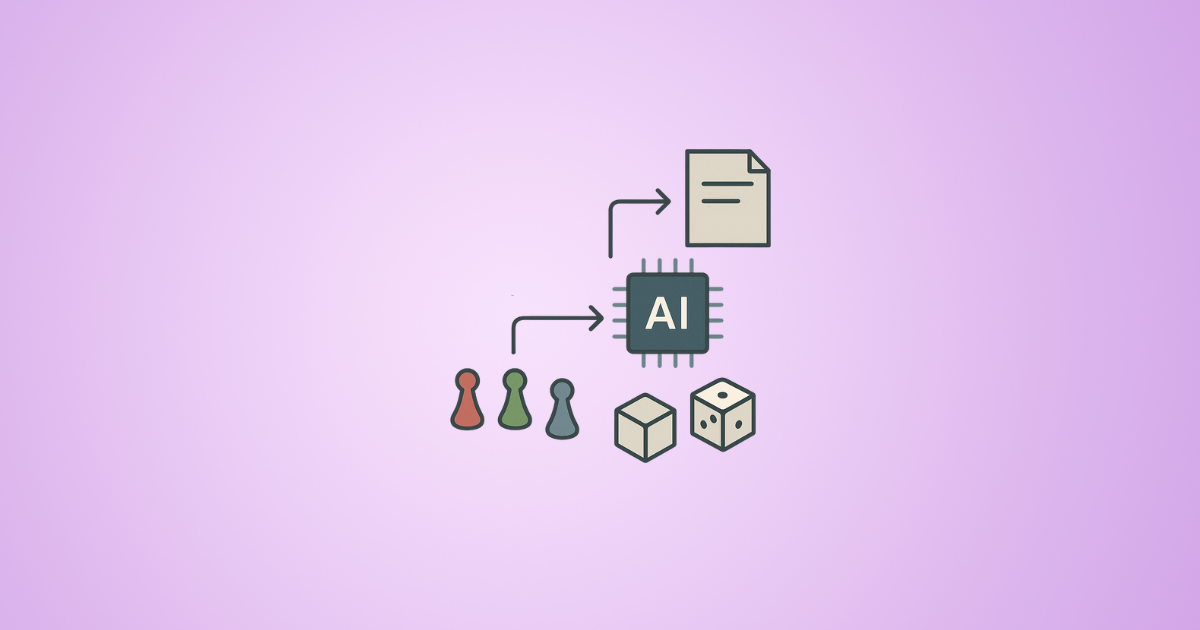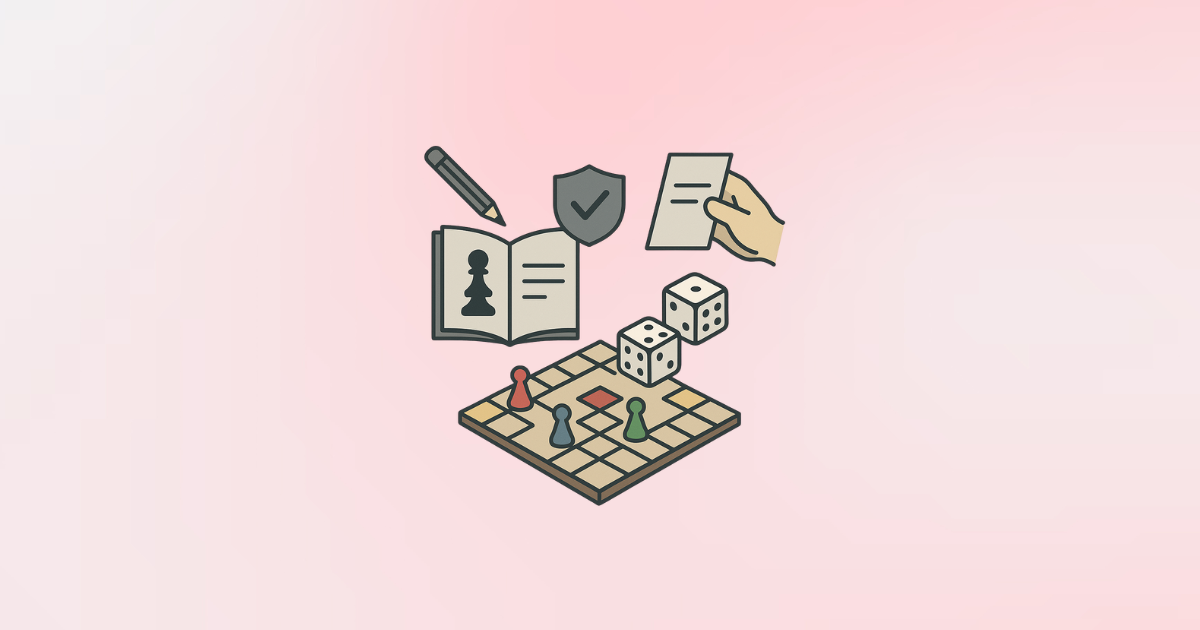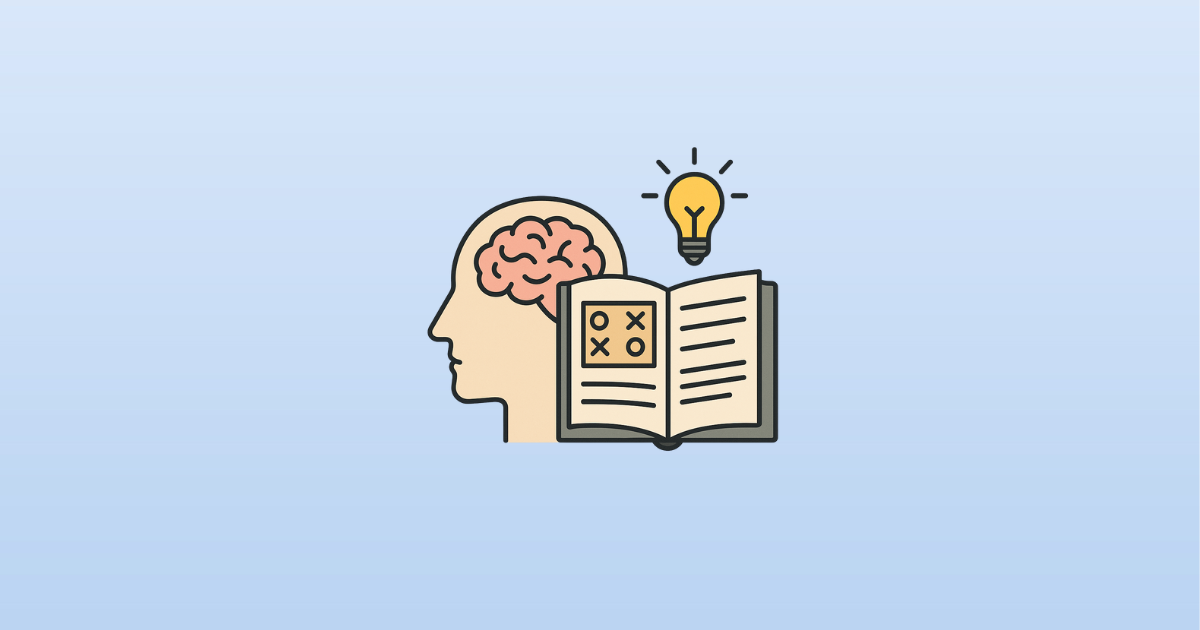Creating a board game is an exciting journey filled with creativity, innovation, and countless hours of refinement. But if you've ever designed a board game, you know that one of the most challenging aspects isn't designing the mechanics or creating beautiful artwork—it's writing a clear, comprehensive rulebook that players can actually understand and follow.
Traditional rulebook creation has long been a pain point for designers. It's time-consuming, requires meticulous attention to detail, and often results in multiple revisions after confused playtesters point out ambiguities or gaps in the rules. But what if there was a way to streamline this entire process? Enter artificial intelligence—a game-changing technology that's revolutionizing how designers approach rulebook creation.
The Traditional Challenges of Rulebook Writing
Before diving into how AI can help, let's acknowledge the real struggles that board game designers face when creating rulebooks. These challenges have persisted for decades, often becoming the bottleneck that prevents great games from reaching their full potential:
The Clarity Conundrum
Writing rules that are simultaneously comprehensive and easy to understand is an art form. You need to cover every possible scenario while keeping the language accessible to players of all experience levels. One poorly worded rule can lead to confusion, arguments, and a poor gaming experience.
Time-Intensive Process
A quality rulebook doesn't happen overnight. Designers often spend weeks or even months crafting, revising, and polishing their rules. This extended timeline isn't just about the writing itself—it includes research into optimal rule structures, studying successful rulebooks from other games, multiple rounds of editing, and countless formatting adjustments. This time could be better spent refining game mechanics, conducting more playtests, or developing new game concepts.
Consistency Challenges
Maintaining consistent terminology, formatting, and tone throughout a rulebook is harder than it seems. As you add sections, revise rules, and reorganize content, it's easy for inconsistencies to creep in.
Design and Layout Complexity
Beyond the written content, rulebooks need visual appeal. Integrating diagrams, examples, and visual aids while maintaining readability requires design skills that many game designers don't possess.
Multiple Revision Cycles
After playtesting, rulebooks often need significant revisions. Each change can create a ripple effect, requiring updates to related sections and potentially introducing new inconsistencies.
Enter AI: The Game-Changer for Rulebook Creation
Artificial intelligence is transforming the board game industry in remarkable ways, and rulebook creation is no exception. AI tools can address many of the traditional challenges designers face, making the process faster, more efficient, and significantly less frustrating.
How AI Revolutionizes Rulebook Writing
Automated Content Generation: Modern AI can analyze your game mechanics, components, and objectives to generate initial rulebook drafts. Instead of starting with a blank page, designers can begin with a structured foundation that covers all essential elements.
Enhanced Clarity and Consistency: AI systems trained on thousands of existing rulebooks understand what makes rules clear and engaging. They can identify ambiguous language, suggest clearer phrasing, and maintain consistent terminology throughout your document.
Intelligent Design Integration: Beyond just text, AI can help integrate visual elements, suggest optimal layouts, and ensure that diagrams and examples enhance rather than distract from the rules.
Real-Time Optimization: As you make changes, AI can instantly identify potential issues, suggest improvements, and help maintain the overall coherence of your rulebook.
Introducing Rulebook.gg: AI Rulebook Creation at Its Finest
When it comes to AI-powered rulebook creation, rulebook.gg stands out as a revolutionary platform that's changing how designers approach this critical aspect of game development. The platform's promise is bold but achievable: help designers "write a rulebook 10× better" and produce clear, print-ready rulebooks in minutes.
The Power of Intelligent Assistance
Rulebook.gg leverages cutting-edge AI to transform the traditionally arduous process of rulebook creation into an streamlined, collaborative experience. Here's how it works:
AI-Driven Drafting: You start by providing information about your board game—the mechanics, components, objectives, and any special rules. The AI then creates an initial draft of your rulebook, complete with structure, formatting, and design elements.
Interactive Refinement: The real magic happens in the refinement process. You can interact with the AI assistant to make changes, clarify rules, add examples, or restructure sections. It's like having a professional technical writer and designer working alongside you.
Intelligent Suggestions: As you work, the AI provides suggestions for improving clarity, identifying potential ambiguities, and ensuring that your rules are comprehensive yet accessible.
Key Features That Transform the Creation Process
Comprehensive Editor for Writing and Asset Management
The platform offers an intuitive editor that goes beyond simple text editing. You can:
- Write and edit rules directly within the platform
- Upload and manage visual assets like component images, diagrams, and examples
- Organize content with drag-and-drop functionality
- Preview how your rulebook will look in real-time
The AI seamlessly integrates all these elements, ensuring that text and visuals work together harmoniously to create a cohesive, professional-looking rulebook.
One-Click Download for Print-Ready Results
Once you're satisfied with your rulebook, rulebook.gg delivers on its promise of efficiency. With a single click, you can download a professionally formatted, print-ready PDF that's ready for:
- Sharing with playtesters for feedback
- Submitting to publishers
- Printing for conventions or demonstrations
- Including in crowdfunding campaigns
This feature alone can save designers hours of formatting work and eliminates the need for expensive design software or professional layout services.
Reducing Friction in the Creative Process
The most significant benefit of using AI for rulebook creation isn't just the time savings—it's the reduction of creative friction. When you're not bogged down by the technical aspects of rulebook creation, you can focus on what really matters: making your game the best it can be.
More Time for Game Development: Instead of spending weeks on rulebook creation, you can dedicate that time to refining mechanics, balancing gameplay, and enhancing the player experience.
Faster Iteration Cycles: With AI assistance, updating your rulebook after playtesting becomes a quick process rather than a major undertaking. This enables more frequent testing and faster improvement cycles.
Professional Results Without Professional Costs: High-quality rulebook design traditionally required hiring professional designers and technical writers. AI democratizes access to these capabilities, allowing indie designers to produce professional-quality results.
The Broader Impact of AI on Board Game Design
Rulebook creation is just one area where AI is transforming board game design. The technology is creating new possibilities across the entire development process:
Rapid Prototyping and Asset Creation
AI tools can now generate game components like cards, boards, and tokens based on simple text descriptions. This capability accelerates the prototyping phase from months to days, allowing designers to test ideas quickly and iterate rapidly.
Balanced Gameplay Development
AI can analyze existing games to suggest balanced mechanics and rule systems. By understanding what makes games engaging and fair, AI helps designers create better gameplay experiences from the start.
Enhanced Playtesting Through Simulation
AI-driven simulations can conduct thousands of virtual playthroughs to identify potential imbalances, edge cases, and areas for improvement. This augments human playtesting with data-driven insights.
Personalized Gaming Experiences
Advanced AI systems can analyze player preferences and adapt game mechanics accordingly, creating dynamic and personalized gaming experiences that keep players engaged.
The Growing Market for AI Board Game Tools
The board game industry is experiencing unprecedented growth, with new games launching every day on platforms like Kickstarter and through traditional publishers. In this competitive landscape, designers are constantly looking for ways to differentiate their games and streamline their development processes.
As the industry embraces AI, searches for terms like "AI board game design" and "AI rulebook" are becoming increasingly common. Designers are actively seeking tools and platforms that can help them leverage artificial intelligence to improve their creative process. This growing interest reflects a broader recognition that AI isn't just a futuristic concept—it's a practical tool that can solve real problems today.
The trend represents a significant shift in how the industry approaches game development. Where once AI might have seemed like science fiction, it's now becoming an essential tool for serious game designers who want to stay competitive in an increasingly crowded market. Publishers are also taking notice, with many now expecting higher production values and more professional presentation from indie designers.
The Democratization of Game Development
One of the most exciting aspects of AI tools like rulebook.gg is how they democratize access to professional-quality game development resources. Previously, creating a polished rulebook required either significant time investment or the budget to hire professional designers and writers. Now, individual designers and small teams can produce results that rival those of major publishers.
The Future of AI in Board Game Development
We're still in the early stages of AI's impact on board game design. As the technology continues to evolve, we can expect even more sophisticated tools that can:
- Generate complete game concepts from simple prompts
- Create adaptive rules that change based on player feedback
- Develop personalized variations of existing games
- Provide real-time guidance during the design process
Best Practices for Using AI in Rulebook Creation
While AI tools like rulebook.gg are incredibly powerful, getting the best results requires understanding how to work effectively with the technology:
Provide Detailed Input
The more information you give the AI about your game, the better it can create a tailored rulebook. Include details about:
- Game mechanics and flow
- Component lists and descriptions
- Target audience and complexity level
- Special rules or unique elements
Iterate and Refine
AI creates an excellent starting point, but the best results come from iterative refinement. Use the AI's suggestions as a foundation, then add your own insights and preferences.
Maintain Your Creative Vision
While AI can handle the technical aspects of rulebook creation, your creative vision should still guide the process. Use AI as a powerful tool, not a replacement for your design judgment.
Test and Validate
Even AI-generated rulebooks benefit from human testing. Use the efficiency gains from AI to conduct more thorough playtesting and gather more feedback. The time you save on formatting and initial writing can be redirected toward testing with diverse groups of players, ensuring your rules work well for both experienced gamers and newcomers to the hobby.
Stay Updated with AI Developments
The field of AI is rapidly evolving, with new capabilities and tools emerging regularly. Stay informed about advances in AI technology for game design, as these tools will continue to become more sophisticated and capable over time.
Conclusion: Embracing the AI Revolution
The integration of AI into board game rulebook creation represents more than just a technological advancement—it's a fundamental shift that democratizes access to professional-quality game development tools. Platforms like rulebook.gg are leading this transformation by making it possible for any designer to create clear, comprehensive, and beautifully designed rulebooks without the traditional barriers of time, cost, and technical expertise.
For board game designers, the choice isn't whether to embrace AI, but how quickly to adopt these game-changing tools. The designers who leverage AI effectively will find themselves with more time for creativity, faster development cycles, and the ability to produce more polished, professional results.
As we look to the future, it's clear that AI will continue to evolve and expand its role in board game development. The tools available today are just the beginning. By embracing AI now, designers position themselves at the forefront of an industry transformation that will define the next generation of board game creation.
Whether you're an indie designer working on your first game or an experienced developer looking to streamline your process, AI tools for rulebook creation offer an opportunity to work smarter, not harder. The result? More time for what you love most—creating amazing games that bring people together around the table.
The future of board game design is bright, and AI is illuminating the path forward. By embracing these tools today, you're not just improving your current projects—you're positioning yourself for success in an industry that's rapidly evolving. The question isn't whether AI will transform board game development, but whether you'll be among the designers leading that transformation.
Ready to transform your rulebook creation process? Visit rulebook.gg and discover how AI can help you write rulebooks 10× better and create print-ready documents in minutes.




